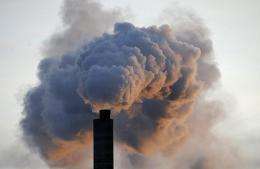Heavy smoke billows from the chimney at a paper plant. US President Barack Obama's administration said Thursday it will regulate greenhouse gas emissions from power plants, after legislation on climate change died in Congress.
US President Barack Obama's administration said Thursday it will regulate greenhouse gas emissions from power plants, after legislation on climate change died in Congress.
The Environmental Protection Agency (EPA) said it would regulate fossil fuel power plants and petroleum refineries -- which together emit nearly 40 percent of US greenhouse gases -- starting in 2012.
"We are following through on our commitment to proceed in a measured and careful way to reduce greenhouse gas pollution that threatens the health and welfare of Americans and contributes to climate change," EPA chief Lisa Jackson said in a statement.
"These standards will help American companies attract private investment to the clean energy upgrades that make our companies more competitive and create good jobs here at home," she said.
The initiative is likely to set up a clash with lawmakers of the rival Republican Party, who will assume control of the House of Representatives next month.
The upcoming rules could also set up a battle between the federal government and oil-producing Texas, which emits far more greenhouse gases than any other state and has adamantly opposed restrictions from Washington.
The last House of Representatives, whose session ended Wednesday, approved the first nationwide US plan to restrict greenhouse gases. But the bill died in the Senate, where Republicans argued it would be too costly.
The EPA did not immediately set a standard, saying it would propose figures in 2011 and finalize them in 2012 after a period of public comment.
The agency said it supported a "modest pace" and "flexibility" in the new standards and would let companies and states find their own ways to meet them.
Obama last year said the United States would curb emissions by 17 percent by 2020 compared with 2005 levels -- a goal presented at UN-led talks on a new climate treaty.
The goal is modest compared to the actions of other developed economies, particularly the European Union.
Most scientists say the world is far off track at meeting a goal -- codified at a UN climate conference in Mexico this month -- of keeping temperatures from rising more than two degrees Celsius (3.6 Fahrenheit) above pre-industrial levels.
(c) 2010 AFP






















